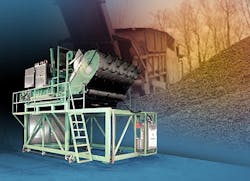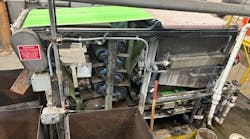Guodian Northeast Environmental Protection Industry Group Ltd. has selected Siemens Industry Automation Division to supply an IPS composting system using the new Mechanically Enhanced Biodrying (MEB) process for the Shenyang Wastewater Treatment Plant Sludge Treatment Project in Shenyang, China. It will be the largest IPS composting facility ever built, and one of the largest sludge treatment processes in the world using non-thermal processing. The IPS composting system is scheduled to be commissioned in the fall of 2012.
The IPS system for Guodian in Shenyang will be used in a new sludge treatment facility that will serve three existing wastewater treatment plants and one new plant. The plants have been landfilling or land-applying wet (20% solids) sludge. China recently passed a law that sludge must be a minimum of 60% solids for land application and/or landfill disposal.
In the first commercial application of Siemens' IPS composting system's biodrying process, the Shenyang plant is designed to dewater 1,000 wet tons per day of wastewater sludge, from 20% solids to 65% solids without the need to add heat, as in a thermal process. Also, with the MEB process, there is no need to add a significant amount of carbon-rich amendment or bulking agent that is typically the case with most other sludge composting processes. For this application, the design basis is to use less than or equal to 2% (by weight) corn waste as amendment. An accelerated processing time of 22 days maximum is expected, even in this cold weather application.
Siemens conducted a six-month pilot test of the MEB process at an existing IPS composting system facility in Merrimack, N.H., from fall 2009 to winter 2010. The study showed that the IPS composting system's MEB process is able to dry and stabilize wastewater sludge that has a total solids content of 20% and a volatile solids content of 60% without the need to add any soil amendments. The MEB process provides a significantly lower energy usage alternative to traditional sludge dryers for reducing the mass of sludge sent to the landfill; thus, it is environmentally beneficial and also lowers operating costs. The study demonstrated that the operating cost savings over thermal drying was approximately 30%.
Based on the success of the pilot study and results of the public tender process, Guodian selected Siemens to execute the project.


